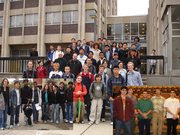06-240/Homework Assignment 1: Difference between revisions
From Drorbn
Jump to navigationJump to search
No edit summary |
m (Reverted edit of 199.164.125.138, changed back to last version by Drorbn) |
||
| (2 intermediate revisions by 2 users not shown) | |||
| Line 4: | Line 4: | ||
# Suppose <math>a</math> and <math>b</math> are nonzero elements of a field <math>F</math>. Using only the field axioms, prove that <math>a^{-1}b^{-1}</math> is a multiplicative inverse of <math>ab</math>. State which axioms are used in your proof. |
# Suppose <math>a</math> and <math>b</math> are nonzero elements of a field <math>F</math>. Using only the field axioms, prove that <math>a^{-1}b^{-1}</math> is a multiplicative inverse of <math>ab</math>. State which axioms are used in your proof. |
||
# Write the following complex numbers in the form <math>a |
# Write the following complex numbers in the form <math>a+ib</math>, with <math>a,b\in{\mathbb R}</math>: |
||
## <math>\frac{1}{2i} |
## <math>\frac{1}{2i}+\frac{-2i}{5-i}</math>. |
||
## <math>(1 |
## <math>(1+i)^5</math>. |
||
# |
# |
||
## Prove that the set <math>F_1=\{a |
## Prove that the set <math>F_1=\{a+b\sqrt{3}:a,b\in{\mathbb Q}\}</math> (endowed with the addition and multiplication inherited from <math>{\mathbb R}</math>) is a field. |
||
## Is the set <math>F_2=\{a |
## Is the set <math>F_2=\{a+b\sqrt{3}:a,b\in{\mathbb Z}\}</math> (with the same addition and multiplication) also a field? |
||
# Let <math>F_4=\{0,1,a,b\}</math> be a field containing 4 elements. Assume that <math>1 |
# Let <math>F_4=\{0,1,a,b\}</math> be a field containing 4 elements. Assume that <math>1+1=0</math>. Prove that <math>b=a^{-1}=a^2=a+1</math>. (''Hint:'' For example, for the first equality, show that <math>a\cdot b</math> cannot equal <math>0</math>, <math>a</math>, or <math>b</math>.) |
||
This assignment is due at the tutorials on Thursday September 21. Here and everywhere, '''neatness counts!!''' You may be brilliant and you may mean just the right things, but if the teaching assistants will be having hard time deciphering your work they will give up and assume it is wrong. |
This assignment is due at the tutorials on Thursday September 21. Here and everywhere, '''neatness counts!!''' You may be brilliant and you may mean just the right things, but if the teaching assistants will be having hard time deciphering your work they will give up and assume it is wrong. |
||
Latest revision as of 11:11, 14 June 2007
| ||||||||||||||||||||||||||||||||||||||||||||||||||||||
Read appendices A through D in our textbook (with higher attention to C and D), and solve the following problems:
- Suppose and are nonzero elements of a field . Using only the field axioms, prove that is a multiplicative inverse of . State which axioms are used in your proof.
- Write the following complex numbers in the form , with :
- .
- .
-
- Prove that the set (endowed with the addition and multiplication inherited from ) is a field.
- Is the set (with the same addition and multiplication) also a field?
- Let be a field containing 4 elements. Assume that . Prove that . (Hint: For example, for the first equality, show that cannot equal , , or .)
This assignment is due at the tutorials on Thursday September 21. Here and everywhere, neatness counts!! You may be brilliant and you may mean just the right things, but if the teaching assistants will be having hard time deciphering your work they will give up and assume it is wrong.

















